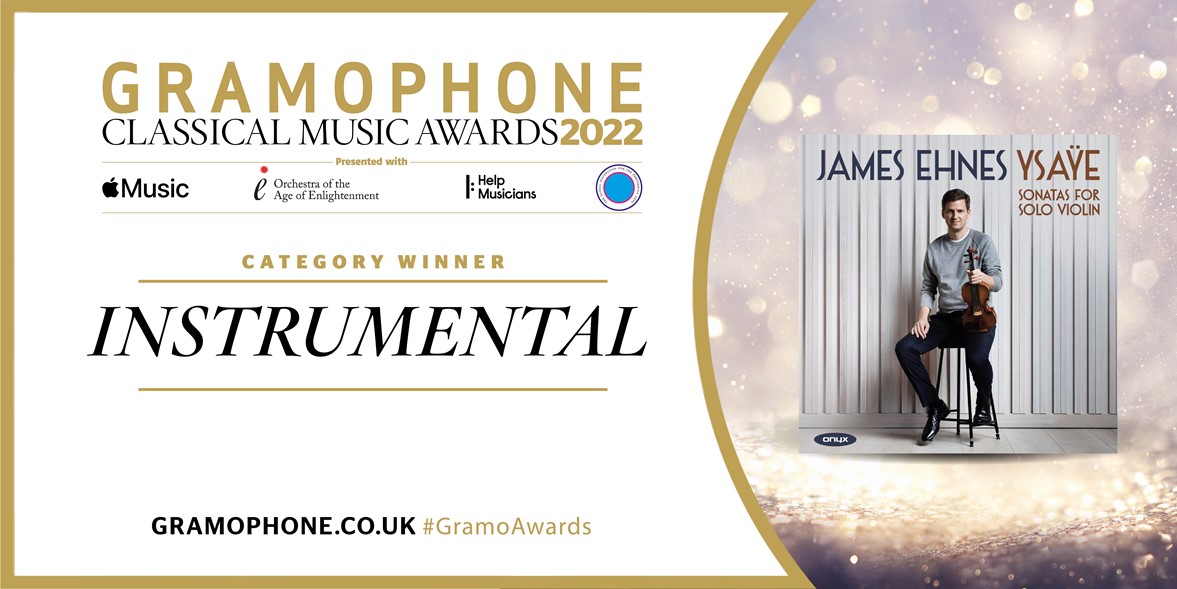Gramophone Instrumental Award 2022
Ysaÿe Six Solo Violin Sonatas
James Ehnes vn
Onyx
Lockdown may not have served many practical purposes but in musical terms this superb home-recorded set of Ysaÿe’s Solo Violin Sonatas (composed in 1924) has provided at least one, James Ehnes having commenced recording in the early hours when all was quiet. Performing in this way ‘during these troubled times makes for a powerful and intimate listening experience’, as Ehnes himself puts it. And you can tell by listening just how powerful that experience was.
Ysaÿe opined that a violin master ‘must be a violinist, a thinker, a poet, a human being, he must have known hope, love, passion and despair, he must have run the gamut of the emotions in order to express them all in his playing’. Which makes you realise just why Ehnes, who is surely among the most thoughtful virtuosos currently performing, is especially qualified for the job. In addition to those human and emotional qualities singled out by Ysaÿe, he has a vivid imagination, which tells with particular impact in his playing of the fifth sonata, dedicated to Mathieu Crickboom, the first movement a dawn scene with its pizzicatos, chord trills and rich harmonies, all maybe echoing birdsong, and ending on a sea of arpeggios. The second movement is a jaunty rustic dance, played by Ehnes with gypsy-style inflections, while the last sonata (dedicated to Manuel Quiroga, who never actually played it in public) – the most overtly virtuoso piece in the set, written around the same time as Ravel’s Tzigane (1922-24) – also suggests a possible element of gypsy influence.
‘Ehnes’s ‘centrist’ approach keeps your attention focused on the music, leaving you to marvel at his technique only after you’ve stopped listening’
The first sonata was inspired by Joseph Szigeti’s playing of solo Bach. It’s a fine showcase for Ehnes’s own performing style, which has a Bachian purity about it (in that respect he rather resembles Arthur Grumiaux), his warmth of attack, gentle slides (though few in number, again I’d reference Grumiaux), sonorous double-stops and arpeggios, keenly etched dynamics (ie the telling reduction of tone at 2'22" into the first movement), and the shimmering tremolando towards the close. There’s a real ease of passage around the start of the fugato and such mastery of the various events that come afterwards, with never a hint of ugly overkill. Also, a complete control of vibrato, never overused; and where chords are played, voicing is also perfectly even, while intonation never falters.
In the second sonata (written for Ysaÿe’s friend Jacques Thibaud), the playful Bach reference at the start (Prelude to the E major Partita) crossed by the famously darkening ‘Dies irae’ motif is very lightly done, whereas the same motif returns deathly quiet at the close of the ‘Malinconia’ second movement. The third sonata or Ballade (for Enescu) is the cycle’s centrepiece in more ways than one, with its Korngold-like melodic lines, which morph into a sort of cadenza and reference all sorts of works, or seem to – Bach’s D minor Chaconne, for example, and the Sibelius Concerto.
Ehnes has indeed ‘run the gamut of the emotions’, and thought deeply about these pieces, too. Sound-wise, his home proves an ideal recording venue, so vivid is the beautiful sound of the instrument used. The excellent annotations are by Philip Borg-Wheeler. As to CD rivals, Kerson Leong (Alpha, 5/21) is also excellent; Thomas Zehetmair (ECM, 1/05) provides a puckish alternative, though Ehnes is warmer; while Oscar Shumsky’s playing style (Nimbus, 8/83) harks back to the Auer school. But Ehnes’s ‘centrist’ approach keeps your attention focused on the music, leaving you to marvel at his technique only after you’ve stopped listening. Rob Cowan
Gramophone Awards 2022 – The Winners
Select an Award-winner below to read full reviews of each of the winning albums and expert insights from our writers.
Recording Categories
Opera & Recording of the Year
Korngold: Die tote Stadt (Sols; Bayerisches Staatsorchester / Kirill Petrenko)
Instrumental
Ysaÿe: Six Solo Violin Sonatas (James Ehnes)
Early Music
Josquin: ‘Baisiez Moy’ (Thélème / Jean-Christophe Groffe)
Orchestral
Mahler: Symphony No 7 (Bayerisches Staatsorchester / Kirill Petrenko)
Concerto
Piano
Beethoven: Diabelli Variations (Mitsuko Uchida)
Concept Album
Enargeia (Emily D'Angelo; Das Freie Orchester Berlin / Jarkko Riihimäki)
Contemporary
Chamber
’Round Midnight (Quatuor Ebène; Antoine Tamestit; Nicolas Altstaedt)
Choral
JS Bach: St Matthew Passion (Sols; Pygmalion / Raphaël Pichon)
Song
Rachmaninov: Songs – ‘Dissonance’ (Asmik Grigorian; Lukas Geniušas)
Voice & Ensemble
‘BariTenor’ (Michael Spyres; Strasbourg Philharmonic Orchestra / Marko Letonja)
Spatial Audio
Ravel: Orchestral Works (Sinfonia of London / John Wilson)
Special Awards
Label of the Year
Artist of the Year
Young Artist of the Year
Special Achievement
Mozart Momentum (Leif Ove Andsnes; Mahler Chamber Orchestra)
Lifetime Achievement
Orchestra of the Year

Gramophone Digital Club
- Digital Edition
- Digital Archive
- Reviews Database
- Full website access
From £8.75 / month
Subscribe
Gramophone Full Club
- Print Edition
- Digital Edition
- Digital Archive
- Reviews Database
- Full website access
From £11.00 / month
Subscribe
If you are a library, university or other organisation that would be interested in an institutional subscription to Gramophone please click here for further information.





